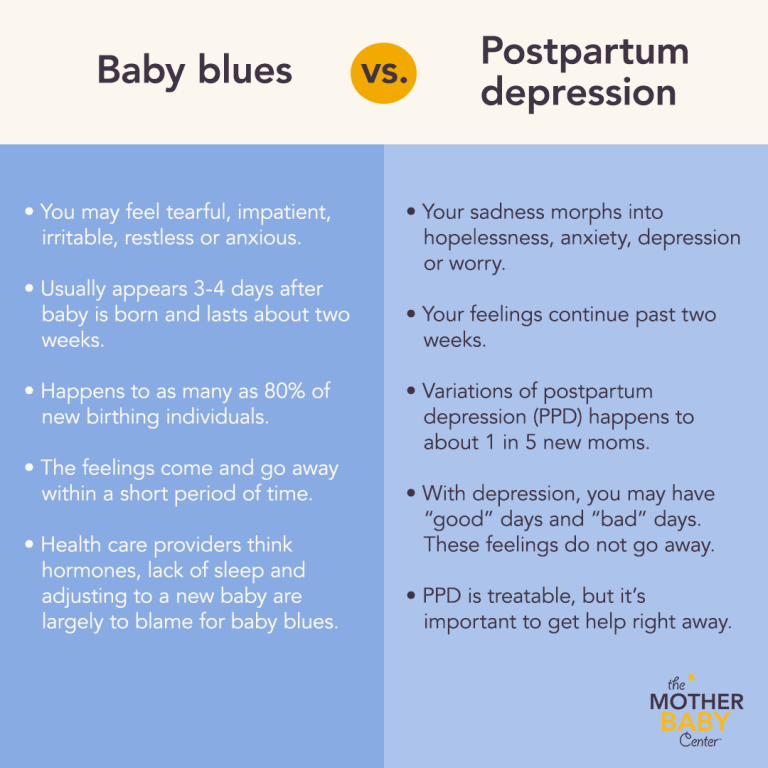You may have been surprised when your friend with a toddler started talking about their fourth trimester of pregnancy. The lesser-known term “fourth trimester” describes the 12-week postpartum period immediately after you’ve given birth.
The family, you and your baby will experience many changes during this time. Your baby will adjust to the outside world and you will adjust to caring for this little human. You also might experience some big emotional changes, thanks again to those pregnancy hormones.
For many birthing individuals, the first few weeks with a new baby are really challenging.
Feelings of being overwhelmed and uncertain about caring for your baby – and being exhausted – are normal. And while everyone around you might be excited and positive, it’s OK to think not everything is going great.
As you begin this next chapter, find tips and feel more prepared for this special time.

Find postpartum support and services from The Mother Baby Center as you navigate parenthood.
What is the fourth trimester?
About 20 years ago, pediatrician and author Dr. Harvey Karp coined the term “fourth trimester” as the first three months of a baby’s life after birth. Dr. Karp said newborns are like fetuses outside of the womb which explains why babies love to be swaddled or have inconsistent sleep patterns. For caregivers, this means adjusting expectations for even more changes.
- Physical recovery: The fourth trimester for birthing individuals and families is just as important for their health as the first three trimesters. Regardless of the type of birth (vaginal, cesarean, etc.), your body needs to recover from the experience.
- Newborn care: Newborns take up a lot of time with the demands of feeding, sleeping, crying, bathing, and more.
- Sleep and fatigue: It may feel few and far between when baby finally rests, especially if they prefer to sleep on your chest or in your arms. For you, your partner, and your family this means you’ll likely have an erratic sleep schedule too.
- Mental health and well-being: New parents and their families experience substantial physiological, social and emotional changes when a new baby arrives. Hormones, exhaustion and being overwhelmed can lead to feelings of sadness and depression. There can also be complex feelings adjusting to being a parent and knowing that life will look a lot differently now than the days before baby.
- Doctor appointments: Well-child appointment schedules can vary depending on your newborn baby’s needs, but generally they’ll be checked out at 3-5 days old, 2 weeks and 1 month, for starters. Your baby’s growth, feeding, sleep, safety, and other important topics are reviewed, and it’s a great chance to ask questions.
When the baby arrives, often the focus shifts to them, and, as a result, new parents can overlook their own health and well-being. During the fourth trimester, many women have little interaction with their healthcare team, which some experts say is when they need care the most. The American College of Obstetricians and Gynecologists (ACOG) recommends a postpartum care plan be developed during the third trimester of pregnancy so that parents are better prepared after the birth

Learn how The Mother Baby Center provides childbirth recovery support and care.
How long does the fourth trimester last
The fourth trimester lasts the first three months after your baby is delivered. Today, the fourth trimester is more broadly understood by health care providers and others as a crucially important time to care for patients after birth. More clearly, goals go beyond a healthy pregnancy and baby to include a healthy parent.
Consider this: In the first few weeks after birth, most are still healing from the birth, which could include a tear during a vaginal birth or a surgical incision after cesarean delivery. Many are coping with the physical and emotional challenges of breastfeeding or other feeding choices. They are sleep-deprived and possibly feeling depressed or having other difficult emotions.
Partners and other adult family members and friends can support the fourth-trimester parent (and each other) by understanding postpartum care is an ongoing process, not just a single appointment or a few helpful prepared meals. It is also important for partners and family members to engage in self-care practices, optimize sleep, optimize nutrition and reach out for support.
Some ways to support the family include:
- Encourage them to make time for themselves.
- Gentle reminders that taking care of oneself is also a form of taking care of her baby.
- Check-in regularly and ask each other about feelings.
- Talk with other new parents and/or join a new parent support group.
- Get fresh air and sunshine.
- Avoid other major life changes during this time, the focus should be on your new family and healing. Planning vacations, moving, getting a new pet and more can wait.
- Encouraging having a snack prior to a nap or sleep at night.
The fourth trimester for baby
Adjusting to life outside of your warm, dark, and cozy womb is a major change for your new baby. Everything is new and different for your fourth-trimester baby and the next 12 weeks is another period of significant development for them. During the fourth trimester, a baby’s brain is learning new sensations like tastes, smells, and sounds. By the time your baby is 3 months old, it can likely hold up its head, make noises to communicate and smile.
With so many changes as your baby grows, it’s important to know a little about what to expect during the fourth trimester period.

Discover support groups for new parents and partners through The Mother Baby Center.
Growth and development
When you first met your baby, they were probably curled up into a little ball, like they were in your womb. During the next three months, their arms and legs will stretch out, muscles will develop, and movements will become more intentional. Your baby can gain a couple of pounds in weight and almost two inches in length by the end of the fourth trimester.
A baby’s brain is well-developed at birth, but it will take some time before they understand the new sensory information coming in. The fourth-trimester baby can see, but their vision is blurry. They can hear and feel, but everything sounds and feels very different from what they’re used to in the womb.
By the end of the fourth trimester, your baby will start to get control of their big heavy head and lift it higher to look around. They might start leaning on their forearms during tummy time and start to push themselves up. They’ll start to interact with family members and toys for longer periods of time, imitate your facial expressions, and smile.
Feeding
Newborns have tiny tummies (generally the size of their fist), so they eat small amounts frequently and are not really on any kind of schedule. As their tummy gets bigger, they’ll eat more at each feeding, and feeding times will stretch out a bit. But the bottom line with a fourth-trimester baby: if they’re hungry, feed! Feeding on demand also encourages your baby to develop healthy eating habits and feel secure.
If you’re chestfeeding, most newborns nurse around 10-20 minutes on one or both breasts, but some can fill their tummies in five minutes while others might take an hour. Most newborns nurse every 2-3 hours, or 8-12 times a day. If you’re bottle feeding, feeding typically takes about 10-20 minutes, depending on the amount of milk or formula in the bottle. Let your baby decide when they’re full.
As you get to know your baby, you’ll recognize signs that your baby is ready to eat, like smacking their lips or rooting for your breast. Crying is a late sign of hunger, and it can be tricky to feed an upset baby.
Remember: Many parents have some problems and lots of questions about breastfeeding, bottle feeding, and making sure their baby is getting enough to eat. It’s perfectly normal to reach out to a lactation consultant, your doctor and your baby’s provider for help. Everyone wants you and your baby to be healthy, happy and feel supported!
Crying
Sorry to say: Your new baby is likely to cry more during the fourth trimester than at any other time in their life. But rest assured, crying is normal. You’ll learn what your baby is trying to communicate with their cries, and soothing their crying is another terrific way to bond with your baby.
Babies cry for several reasons:
- It’s their first way to verbally communicate with you.
- They are hungry or uncomfortable (wet diaper, too cold, sleepy, etc.).
- Crying can release tension when a baby is feeling stressed or overwhelmed.
The best way to calm a crying fourth-trimester baby is to respond quickly. According to the American Academy of Pediatrics (AAP), it’s better to pick up your crying baby every time. When a baby learns you take their cries seriously, they become less anxious, clingy, and demanding in the long run.
A few ways to soothe a crying baby include:
- Swaddle your baby snuggly in a lightweight cloth, recreating the cozy space of your womb.
- Wearing your baby in a sling across your chest can feel familiar and comforting to them.
- Movements like swaying or rocking, or even driving around in a car, can soothe an upset baby.
- Skin-to-skin contact is a great comfort for your newborn. There are actually nine stages of skin-to-skin contact that encourage natural bonding with your baby.
- A warm bath can calm an upset baby because floating is relaxing and like being in the womb.
Sleeping
Sleep for anyone might feel like an unattainable goal during the first few weeks with a newborn, but by the end of the fourth trimester, you’ll likely have a fairly predictable sleep pattern figured out. Creating a daily routine can signal to your baby at night it’s time to rest by doing things like using quiet voices, rocking your baby in the bedroom, or dimming the lights.
During the first 12 weeks postpartum, babies need 14-17 hours of sleep each day. However, newborn babies have little understanding of day and night, and they typically only sleep 2-4 hours at a time. By about 6-8 weeks old, babies tend to sleep more at night, but they still wake up for feedings.

Learn how The Mother Baby Center provides childbirth recovery support and care.
What postpartum symptoms occur during the fourth trimester?
Your body has just accomplished an amazing thing: you made another human! Now it’s time to give your body the healing care it deserves. The transition from pregnancy to postpartum comes with its own list of symptoms – and every new parent’s experience is different – so try to be patient as your body recovers during the fourth trimester. And remember there are many resources to support you during this time!
Here are a few things to consider with fourth-trimester pregnancy symptoms:
- Physical recovery: Even if you had an “easy” pregnancy and a “perfect” birth experience (or maybe you had neither of those things), your body has been stressed and stretched to the max. You’ll experience soreness throughout your body, a gassy postpartum is possible as organs shift to their original place, postpartum bleeding can occur, and milk production can make breasts tender.
- Hair loss or skin changes: It is not uncommon to experience postpartum hair loss, dry skin and breakouts a few months after pregnancy. Your estrogen levels are resetting and causing your hair to shed and your skin to react. The good news is it’s temporary and your hair and skin should return to normal by your baby’s first birthday.
- Weight change: It took nine months to grow your baby, so it’s going to take some time to get your body back to “normal.” Most gain 25-35 pounds during pregnancy and shed about 13 pounds after giving birth. Now is the time to give yourself a break and focus on creating a healthy, happy body rather than focus on “getting your body back.”
- Heightened emotions: You’ve heard of the “baby blues,” feelings of sadness, irritability, and anxiety that kick in a few days after birth. About 8 in 10 women feel down after giving birth.
For most new moms, these feelings subside in about two weeks. But for about one in five people, postpartum depression can settle in. Keep in mind that “baby blues” can affect our partners and support team as well and we encourage the entire family to seek care if needed.
Why are postpartum emotions so strong?
Mood swings, sadness, irritability, and anxiety are totally normal after pregnancy. Your body has been working hard to grow a baby for the past nine months. Now that your baby has moved out, your hormones are giving your body a whole new set of directions to reset. Add to that all the stress, exhaustion and joy that comes with an expanding family.
However, if you’re feeling really anxious, deeply sad, or depressed or having thoughts of harming yourself or your baby, you could have postpartum depression (PPD) or postpartum anxiety (PPA). These mental health issues are not your fault, and they are treatable. You should contact your health care team if you need help.
Fortunately, your hormones and emotions should level off in a week or two. This worksheet can help you make a plan to prioritize your mental health.
Postpartum hormones
Research says your hormones estrogen and progesterone go from the highest levels they’ll ever be during pregnancy to the lowest they’ll ever be after giving birth. Then, your hormone oxytocin, which is called the “bonding hormone,” surges in, turning on your parenting instincts. All these hormonal fluctuations stir up mood swings, anxiety, sadness, irritability and sometimes depression. Fourth-trimester emotions are no joke, so trust what you’re feeling is totally normal and will get better.
Sleep deprivation and fatigue
Sleep deprivation and fatigue is typically the number one struggle for new parents. After your baby arrived, you quickly discovered it’s going to take some time for your baby to settle into a sleep routine. And even if/when they do, you’re still going to be up with them every few hours for feedings.
You need a sleep strategy. For example:
- Sleep when your baby is sleeping.
- Take turns sleeping and feeding with your partner or support person.
- Delegate chores and errands. Friends and family members are often eager to help when a new baby arrives. Let them!
Quality sleep is really important for your recovering fourth-trimester body and your mental health. Talk to your healthcare team if you need help getting the sleep you need.
Sense of self and identity
Being a parent is thrilling and you’ve been anticipating your baby’s arrival for nine months (and maybe longer). Now that they are here, it’s setting in that life as you knew it is over and this new chapter is really different. Maybe you’re even feeling a lost sense of identity and struggling with how to process becoming a parent. We’ll say it again: that’s normal.
You don’t need to feel like you’re going through this alone either. New parent groups – either for couples or individuals – can be helpful to meet other parents and share your feelings with people who understand because they’re going through the same things. This is a great way to find support and build a new sense of identity.
Anxiety and stress
We mentioned the hormone oxytocin and how levels of it tend to surge after delivering a baby. Oxytocin “turns on” your parenting behaviors, which includes your sense of danger and protecting your child.
When your oxytocin goes up, so can your feelings of anxiety. Now add to that, your progesterone – which tends to lower anxiety – drops after giving birth. This combination can make anxiety and stress feel out of control.
Here’s one more: thyroid hormones. For 5-10% of women, their thyroid is inflamed after giving birth. Symptoms of that include insomnia, anxiety and rapid heart rate.
The bottom line is if you’re feeling anxious or stressed, your hormones are very likely to blame. Plus, you’re exhausted, and you might also be struggling with taking care of your baby. Talk to your provider about how you’re feeling during the fourth trimester of pregnancy and don’t be afraid to ask for help.

Peace of mind, delivered with the care you’re due at The Mother Baby Center.
Postpartum ‘baby blues’ vs. postpartum depression
Sadness and feeling down for 7-10 days after giving birth happens to as many as 80% of new birthing individuals. It’s called the “baby blues” and health care providers think hormones, lack of sleep and adjusting to a new baby are largely to blame.
However, if these feelings of sadness continue past two weeks and morph into hopelessness, anxiety, depression, or worry, then it could be postpartum depression (PPD). Variations of PPD happen to about 1 in 5 new moms. PPD is treatable, but it’s important to get help right away.

Coping with the fourth trimester
The fourth trimester of pregnancy is survivable, and it can be enjoyable! Take each day with your new baby as it comes, realizing some days will be easier than others. Here are a few more tips for coping with the fourth trimester:
- Ask for help: Put those eager friends and family members to work! Taking care of your baby and you are the most important jobs during the fourth trimester. Laundry, cleaning bathrooms, meal preparation and errands can be delegated.
- Take it easy: The list of things to do seems endless when a newborn arrives. Resist extra obligations, take time off work if you can, and try to enjoy these early days cuddled up with your baby.
- Nourish your body: Eating healthy is important for your body (and your baby’s if you’re breastfeeding), but it’s also important to get enough calories and keep up your energy. If a huge salad doesn’t sound good right now, then eat the mac and cheese. Just remember that balance is the key to a maintainable diet.
- Drink water: Your body needs a lot of hydration after giving birth, especially if you’re chestfeeding.
- Get help with breastfeeding: If things aren’t working, and you want to keep trying, a lactation consultant can be really helpful.
- Let yourself heal: Whatever type of birth you had, you need to recover. It takes time and intention to heal after delivering a baby.
- Go to your postpartum appointments: It’s recommended that new parents have their first postpartum visit with their pregnancy provider within three weeks of giving birth. You’ll have a comprehensive exam at the end of the fourth trimester, around the 12-week mark.
- Get some exercise and fresh air: Start with a slow daily walk to stretch your legs and get some fresh air. Make sure to check in with your health care team before starting any vigorous exercise regimen during the fourth trimester.
- Have grace with yourself: It’s easy to be hard on yourself but try to remember: You just did one of the hardest and most amazing things and now it’s time to recover and be gentle on yourself.
Partner support during the fourth trimester
You, your partner, family and friends have been anticipating the birth of your baby for nine months, and now that it has happened in many ways it feels like things are just getting started. Welcome to life with a newborn! This little baby has a lot of needs, but the needs of you and your partner are also important.
Here are some ideas for supporting each other during the fourth trimester of pregnancy:
- Help your partner recover from birth. There’s a lot going on with a body that just gave birth. Be flexible and attentive to each other, being open about your feelings.
- Support chestfeeding or formula feeding goals. Feeding a baby can be tricky, and often there are challenges and sometimes it doesn’t work, or one wants to feed your baby a different way. Offer gentle support and be ready to call in the professionals (lactation consultants) when needed.
- Bond with your baby. Partners can bond with their baby during bath time, diaper changes, daily walks, and soothing them when crying. Skin-to-skin snuggling is also a terrific way for partners to develop a special bond with their baby.
- Understand emotional swings – and watch for signs of postpartum depression. Remember the hormone fluctuations they might be experiencing and give space when needed. Watch for signs of depression and encourage support when needed.
- Check your own mental health. Research suggests up to 25% of new partners suffer from paternal postnatal depression (PPND), a mood disorder that has the same symptoms as PPD – irritability, isolation, fatigue, and sadness. Depression can happen to anyone and it’s important to seek support if you’re feeling depressed.
- Do the chores, or delegate. While your partner sneaks in a nap, wash bottles, do a load (or several) of laundry, or get dinner started. Better yet: take advantage of supportive family and friends looking to step in and help.
- Make food, offer snacks and fill up the water bottle. Keep that new parent eating and drinking to support their recovery and breastfeeding.
- Be patient when it comes to sex and intimacy. Communication is key here. Sex is usually okay at 6-8 weeks if everything is healed, but more importantly it occurs when the new birthing individual feels ready. Before you become sexually active again, talk with your partner and health care provider about birth control or cycle control.
- Check-in with each other. You might feel like two ships passing in the sleepless night, but you and your partner have a common goal: take care of that beautiful new baby. Chances are you’re feeling many of the same things about this big new chapter in your life. Make time to ask each other about feelings.
Discover support groups for new parents and partners through The Mother Baby Center.
When to find additional support
As we’ve been saying, there’s a lot going on during the fourth trimester of pregnancy for the baby and family. Most fourth trimester symptoms are normal and will resolve on their own, but there are some warning signs that need to be taken seriously. It’s important to get help right away if you have any of the following:
- Heavy, bright red bleeding or clots: During the postpartum recovery there can bleeding or spotting up to 4-6 weeks, but if it’s heavy all at once it could be a hemorrhage. The general rule is that you shouldn’t saturate a pad in an hour or less.
- Fever or chills: This could be a sign of infection.
- Dizziness: This could be associated with blood loss or dehydration.
- A hard or painful lump in your breast: There are many ducts in your breast, and they can get clogged or infected whether you’re chestfeeding or not.
- Pain, tenderness or swelling in your legs or feet: This could be a sign of a blood clot.
- Severe headache: This could also be a sign of preeclampsia or related to hormones.
- Deep sadness, thoughts about death or harm for yourself or your baby: Postpartum depression (PPD) is real, serious and can be treated when you get help.
All of these symptoms can be life-threatening and should not be ignored or chalked up to being regular postpartum symptoms. If something is out of the ordinary, contact your provider or go to the emergency department right away.
Those who are considered high risk – anyone who had diabetes, high blood pressure, obesity, traumatic birth experience or another chronic health condition – should be extra vigilant about any signs and symptoms that are not normal during the fourth trimester.
Find support at every stage of pregnancy with The Mother Baby Center
Chances are in 12 weeks of the fourth trimester, you’re not going to feel or look exactly like you did before you were pregnant, or that you’ll know everything about caring for your baby. From now on, life with a baby is about adjusting to each new stage. It doesn’t matter if it’s your first or fourth baby, with every new arrival comes new adjustments and things to learn.
During the next few months, you will start to feel more like your old self and more physically and emotionally comfortable being a parent than you do now. And your newborn baby will be an interactive, smiley, sleeping (hopefully!) 3-month-old.
It’s impossible to anticipate all of the questions you might have during the fourth trimester, so keep these resources from The Mother Baby Center handy and let us be there to support you when you need us.
